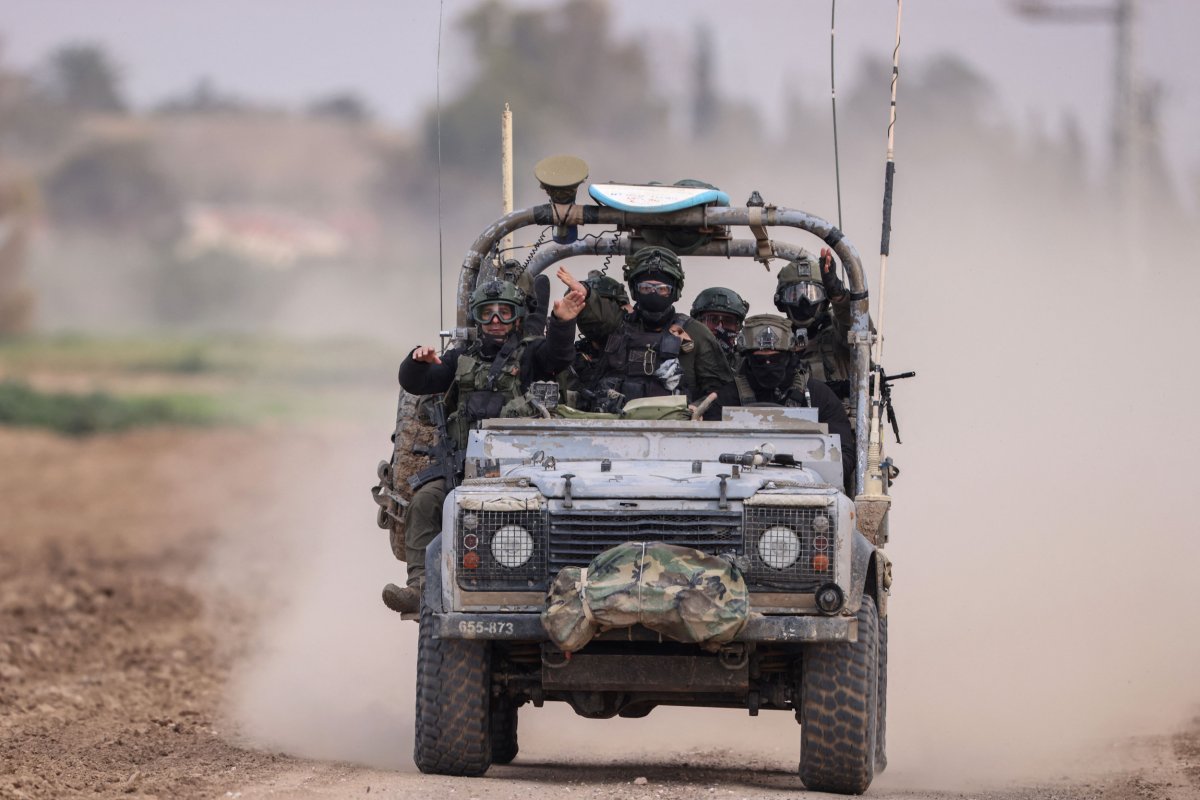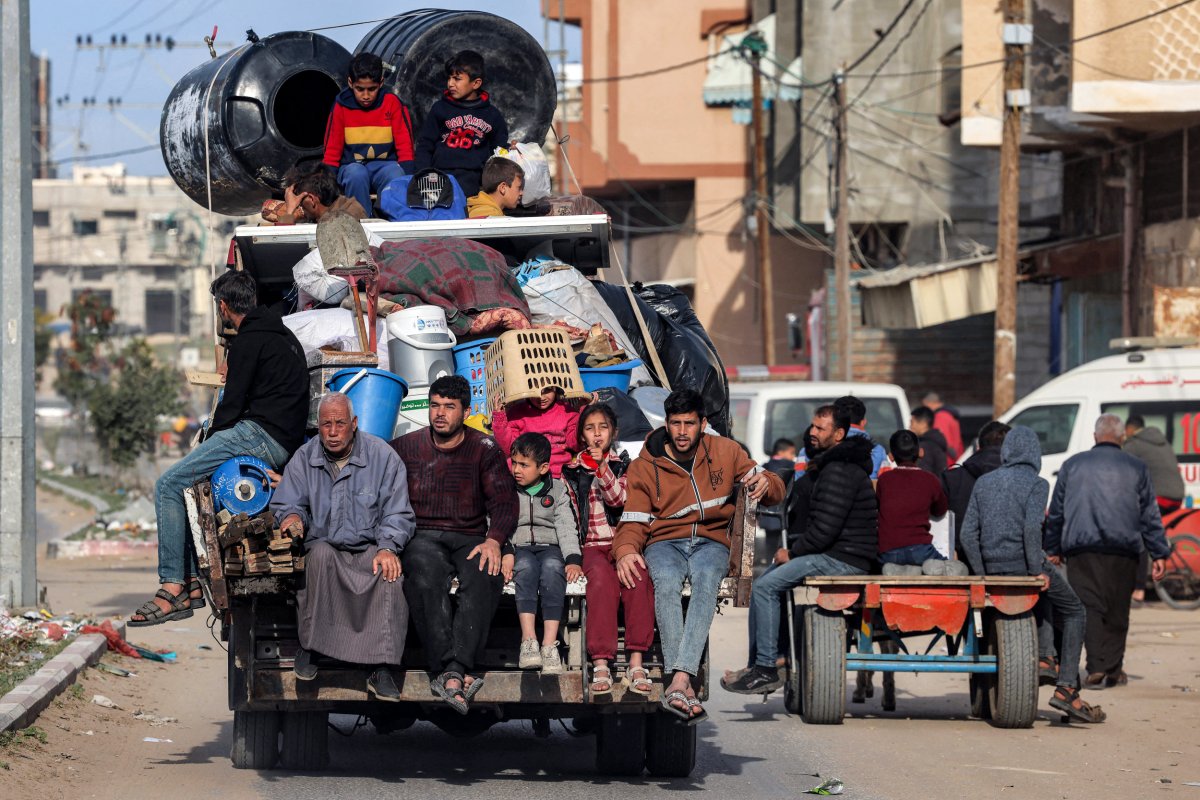Tom O'Connor
The Israel Defense Forces (IDF) is preparing to conduct more raids to both rescue hostages and take out high-value targets as it looks to enter a new, more surgical phase of the war in Gaza.
Speaking to Newsweek during a press briefing hosted Monday on X, formerly Twitter, IDF spokesperson Lieutenant Colonel Richard Hecht said that anyone who "threatens Israel, is about to maybe strike or attack—we will go after him wherever is needed, if it's on the Lebanese border or anywhere in Gaza."
"You can see this as this battle unfolds. The form and how it's being executed is different," Hecht said. "You're seeing now inside of Gaza a more sort of surgical style of operation; it's with our special forces division, the 98th Division, under the commander, our great [Brigadier] General Dan Goldfuss."
"It's more surgical, less armor, more infantry and special forces," he added, "but these raids are happening."
The remarks came shortly after the IDF announced a joint operation conducted alongside intelligence and police forces on Monday to successfully rescue two Israeli hostages being held in Rafah in southern Gaza. The two men were among more than 200 people seized by Hamas and other Palestinian factions during their October 7 surprise attack that sparked the war.
Hamas rejected the IDF's account of the operation. At a press conference, senior official Osama Hamdan pointed to "field press accounts that indicate that the two captives were not in the possession of the Hamas movement, but rather in the possession of a civilian family, which casts doubt on the credibility of the occupation's narrative, and confirms its effort to exaggerate the event in search of a missing achievement in the face of the resistance."

An Israeli military vehicle transports troops near the border with the Gaza Strip on February 12. The war is still raging between Israel and Hamas.
Hecht's comments also follow a series of drone strikes widely attributed to Israel in Lebanon that have reportedly targeted senior officials of Hamas and the Lebanese Hezbollah movement.
The IDF and Hamas have regularly accused one another of war crimes throughout their deadliest-ever conflict, now in its fifth month, and Hamas has specifically criticized Israel's targeting of individuals outside of Gaza as well.
"The Israeli occupation army has assassinated at least 22 Palestinians in Lebanon and Syria since Oct. 7, including the deputy chief of the Hamas resistance movement, Sheikh Saleh Al-Arouri, in Lebanon, along with two top resistance commanders of Al-Qassam Brigades," Hamas' media office said in a press briefing shared with Newsweek on Monday.
Newsweek has reached out to Hamas for further comment.
The IDF has neither confirmed nor denied its involvement in the strike last month that killed Arouri in a southern suburb of the Lebanese capital of Beirut nor in at least two more recent high-profile attacks in which Arab and Israeli outlets reported that Israel targeted senior Hamas and Hezbollah officials in Lebanon.
Days after the strike that killed Arouri, Newsweek spoke with an IDF drone operator who discussed Israel's expanded use of unmanned aerial vehicles in the conflict, specifically the Elbit Hermes 900 and 450 platforms. The IDF and its special forces units also have a lengthy history of conducting daring raids behind enemy lines.
The current conflict has presented unique challenges, however, especially as Israeli Prime Minister Benjamin Netanyahu has vowed to press on until "total victory" in achieving his goals of eliminating Hamas and rescuing all remaining hostages in Gaza.
Though the IDF has established a significant presence in Gaza and has continued to target Hamas infrastructure and operatives, Netanyahu and senior Israeli political and military officials have indicated the war may drag on for some time.
Meanwhile, international pressure has also mounted on Israel over growing civilian casualties.
Health officials in Gaza have reported that more than 28,000 Palestinians, mostly women and children, have been killed since the war began. Israeli officials estimate that around 1,200 people, the majority of them civilians, died in the initial attack on Israel and that more than 200 military personnel have died in the ensuing IDF offensive against Gaza.
The United States has called on its ally to do more to protect civilians and transition to a more "surgical" phase of the conflict. Amid these calls, the IDF announced at the beginning of the year that it would begin withdrawing at least five brigades from Gaza.
New concerns have been raised, however, regarding Rafah, the site of the Israeli rescue raid on Monday, along with strikes regularly conducted by the IDF. The southern city is believed to now hold up to half of Gaza's 2.2 million people, many of them displaced by fighting elsewhere in the densely populated territory, along with what Netanyahu has said were up to four Hamas battalions.
Ashraf al-Qudra, spokesperson for the Hamas-led Palestinian Health Ministry in Gaza, said in a statement that 67 people were killed in what he said amounted to a "massacre committed by the Israeli occupation" in Rafah on Monday.
While the White House has at the same time repeatedly stated that it supported Israel's war effort and has stepped up military aid since October 7, President Joe Biden described Israel's military operations in Gaza as "over the top" last week.
During a call held Sunday with Netanyahu, Biden "reaffirmed his view that a military operation in Rafah should not proceed without a credible and executable plan for ensuring the safety of and support for the more than one million people sheltering there," according to a readout provided by the White House.
State Department spokesperson Matthew Miller reiterated this position but downplayed the latest Israeli strikes in Rafah during a press conference in Washington, D.C. on Monday.
"They have conducted airstrikes against Rafah really since going back to the original days of the campaign," Miller said. "It is not our assessment that this airstrike is the launch of a full-scale offensive happening in Rafah."
"We just saw, obviously, the order from the prime minister last week to the Israeli military to develop a plan for dealing with Rafah," he added. "We look forward to reviewing that plan, we look forward to being briefed on it and we will make clear as we did last week and as the president did in his conversation over the weekend that, without such a plan that is credible, that they can execute, we do not support a full-scale military operation there going ahead."

A Palestinian family flees Rafah in the southern Gaza Strip on February 12, 2024. Sixty-seven people were killed in Rafah, Gaza health officials said.
Hecht also addressed the issue of Rafah during the virtual press briefing on Monday, saying a plan to establish evacuation routes for civilians was "still being developed" but assured that "it will be done in a rational way."
IDF spokesperson Lieutenant Colonel Peter Lerner, too, weighed in on the issue during the same event.
"Of course, the government has instructed the IDF to create that plan of action," Lerner said, "one which is both a plan that has the combat element of defeating destroying the battalions of Hamas in refer on one hand, but also the evacuation of civilians in accordance with the expectations of ourselves and our allies around the world."
"So, when we combine that and when and if the government instructs us to mobilize, then we will be ready," he added. "We will be ready with a plan of action, a feasible plan of action, and a plan of action that gets people out of harm's way."
Lerner pointed to the recent operation in Rafah as a potential indicator of more special forces activity to come.
"I expect there to be more operations that are more special type of operations, whether they happen in the north in the center or in the south, more [infantry] units, more perhaps in Rafah," Lerner said. "I expect this to develop into more of these mini-successes that create a bigger picture of success."
No comments:
Post a Comment